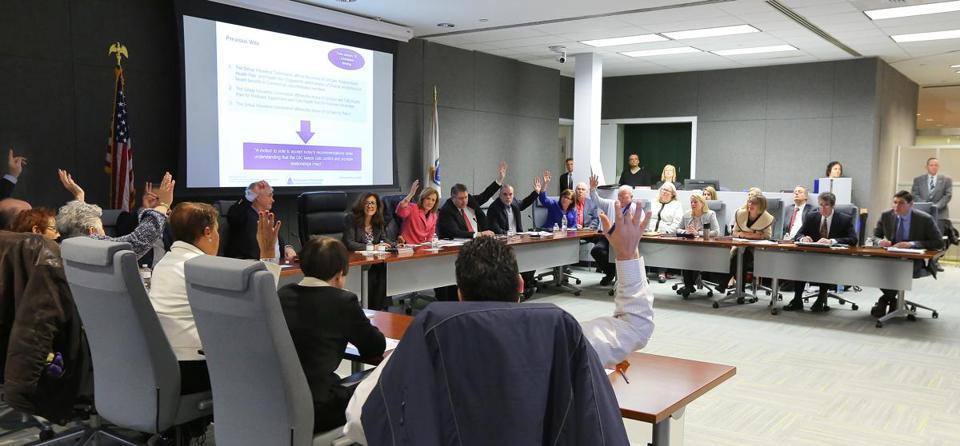By Priyanka Dayal McCluskey GLOBE STAFF FEBRUARY 22, 2018
Massachusetts public employees and retirees received an unusual bit of good news from state officials Thursday: their health insurance premiums are not rising significantly — and costs for many will actually decrease.
By Priyanka Dayal McCluskey GLOBE STAFF FEBRUARY 22, 2018
Massachusetts public employees and retirees received an unusual bit of good news from state officials Thursday: their health insurance premiums are not rising significantly — and costs for many will actually decrease.
The rates approved by the Massachusetts Group Insurance Commission apply to hundreds of thousands of state and local employees, retirees, and their families, including teachers, transportation workers, social workers, and those in all branches of state government.
The commission came under fire last month after making a surprise decision to eliminate commercial health plans from three popular insurance companies, a change that would have disrupted some 200,000 people. That angered public workers, labor unions, and elected officials, and after an outcry, the commission reversed course and decided to maintain the commercial insurance options it currently offers.
But public workers and retirees still worried that their health insurance costs could soar. The fact that premiums will remain relatively flat next year should come as a relief — at least, temporarily.
“Our average premium increase will be zero — well ahead of our goal,” said Dr. Roberta Herman, executive director of the state commission, which is controlled by the Baker administration.
Half of the people who get health benefits through the state will see their premiums go down, commission officials said. Forty percent will see premium increases, but for most of them, the increases will be 2 percent or less.
For 10 percent of those enrolled in state health benefits, premiums will stay approximately the same. The new premiums take effect in July.
Also, the benefits, co-pays, and deductibles for public workers and retirees will stay about the same.
“This is kind of unheard of,” Herman said, noting that in the broader health insurance market, costs are increasing at a faster clip.
Herman said commission officials made two big changes to help contain costs. They consolidated prescription drug benefits to two pharmacy benefit managers and will contract with those companies directly. They also decided to bear the insurance risk for more of their enrollees.
“For the members, it’s a great thing,” said Timothy D. Sullivan, who represents the Massachusetts Teachers Association on the Group Insurance Commission. “I think members will be very pleased.”
“What next year brings, nobody knows,” Sullivan added in an interview.
Still, about 5,000 people who receive health coverage through the commission will see increases of more than 10 percent.
Commissioner Jane Edmonds said she was concerned about a subset of retirees who will have to pay significantly higher rates.
“What can we do to address these individuals?” she asked. “I can imagine some people will say ‘I just can’t afford it.’ ”
Herman said the commission staff would continue looking for ways to keep costs affordable.
Following the controversy of the past several weeks, Herman said the commission staff also has expanded efforts to communicate with commissioners, legislators, and others. “We’ve been sharing a lot more,” she told reporters.
The commission took heat in recent weeks for poor communication. On Jan. 18, it voted 8-5 to slash costs in part by cutting commercial health plans from Harvard Pilgrim Health Care, Tufts Health Plan, and Fallon Health — all Massachusetts-based nonprofit insurers.
The surprise move was widely condemned by public workers and politicians. Governor Charlie Baker acknowledged the commission’s process was flawed and had stirred confusion. Attorney General Maura Healey’s office began investigating whether the commission violated the state’s Open Meeting Law, and state senators questioned commission officials at a public hearing.
Following the backlash, the commission reversed its decision on Feb. 1.
Public employees on commercial health plans will continue to have six carrier options: Harvard Pilgrim, Tufts, Fallon, Neighborhood Health Plan, Health New England, and UniCare.
Retirees on Medicare plans can choose from Harvard Pilgrim, Tufts, Health New England, and UniCare.
“It’s been a rough month for us, given our failed effort to consolidate the plans,” said commissioner Melvin A. Kleckner, the town administrator of Brookline.
“I guess we’ve rebounded from that and are moving forward.”
Kleckner said he was pleased with the new insurance rates and that “they are really going to make a significant difference to the Commonwealth and cities and towns.”
Priyanka Dayal McCluskey can be reached at priyanka.mccluskey@globe.com. Follow her on Twitter @priyanka_dayal.



